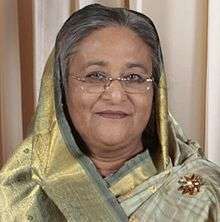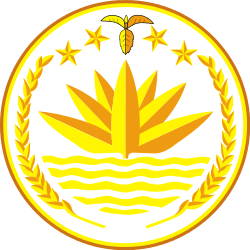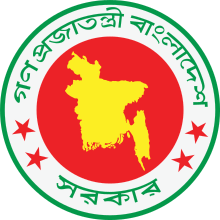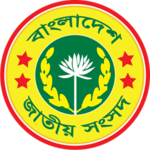Cabinet of Bangladesh
The Cabinet of Bangladesh (Bengali: বাংলাদেশের মন্ত্রিসভা – Bānglādēśēr Mantri'sabhā) or Council of Ministers (Bengali: বাংলাদেশের মন্ত্রিপরিষদ – Bānglādēśēr Mantri'pariṣad) is the chief executive body of the People's Republic of Bangladesh. The Cabinet is the collective decision-making body of the entire government under the Office of the Prime Minister, composed of the Prime Minister and some 25 Cabinet Ministers, 7 Advisers, 18 State Ministers and 3 Deputy Ministers.[1][2][3]
| Fourth Hasina Cabinet | |
|---|---|
20th Council of Ministers of Bangladesh | |
| Incumbent | |
 Sheikh Hasina Wazed | |
| Date formed | 7 January 2019 |
| People and organisations | |
| Head of state | Abdul Hamid |
| Head of government | Sheikh Hasina |
| No. of ministers | 25 Cabinet Ministers 7 Advisers 18 State Ministers 3 Deputy Ministers. |
| Total no. of members | 54 |
| Member party | Awami League |
| Status in legislature | 117-seat single-party majority 257 / 300 |
| History | |
| Legislature term(s) | 11th Parliament |
| Predecessor | Hasina III |
 |
|---|
| This article is part of a series on the politics and government of Bangladesh |
|
Constitution and law
|
|
Government |
|
|
|
|
|
Responsibility
Ministers of the government, according to the Constitution of Bangladesh, are selected primarily from the elected members of House of Nation, also known as Jatiya Sangsad. Cabinet Ministers are heads of government departments, mostly with the office of the "Minister of [department, e.g. Defence]". The collective co-ordinating function of the Cabinet is reinforced by the statutory position that all the Ministers jointly hold the same office, and can exercise the same powers.
The Cabinet is the ultimate decision-making body of the executive within the parliamentary system of government in traditional constitutional theory of Bangladesh. This interpretation was originally put across in the work of the Bangladesh constitution in 1972. The political and decision-making authority of the cabinet has been gradually increased over the last few decades, with some claiming its role has been usurped by "Prime Ministerial" (i.e. more "presidential") government.
The Cabinet is the executive committee of The Prime Minister's Office, a historic body which has legislative, judicial and executive functions, and whose large membership does include member(s) of the Opposition or Coalition. Its decisions are generally implemented either under the existing powers of individual government departments, or by the Cabinet Secretary, the most senior civil servant in Bangladesh.
There shall be a Cabinet for Bangladesh having the Prime Minister at its head and comprising also such other Ministers as the Prime Minister may from time to time designate. The executive power of the Republic shall, in accordance with this Constitution, be exercised by or on the authority of the Prime Minister. The Cabinet shall be collectively responsible to Parliament. All executive actions of the Government shall be expressed to be taken in the name of the President. The President shall by rules specify the manner in which orders and other instruments made in his name shall be attested or authenticated, and the validity of any order or instrument so attested or authenticated shall not be questioned in any court on the ground that it was not duly made or executed. The President shall make rules for the allocation and transaction of the business of the Government.
— Article 55 (1-6): The Cabinet; Part-IV (The Executive), Chapter II: The Prime Minister and the Cabinet, The Constitution of Bangladesh[4]
Council of Ministers
The most influential part of the executive of the Bangladesh government are the ministries.[5] A ministry headed by a Minister or State minister (Independent Charges) shall be responsible for conducting the business of his Ministry/Division in the Parliament unless otherwise directed by the Prime Minister's Office. The Secretary is the administrative head of a ministry or division; and is assisted by an Additional Secretary, Joint Secretary, Deputy Secretary, Senior Assistant Secretary and Assistant Secretary. A few ministries consist of more than one division.
There are four categories of ministers, in descending order of rank:
- Minister: member of cabinet; leads a ministry
- State Minister (Independent Charges): junior minister not reporting to a cabinet minister; leads a ministry
- State Minister: junior minister reporting to a cabinet minister, usually tasked with a specific responsibility in that ministry
- Deputy Minister: most junior minister reporting to a cabinet minister or Minister of State (Independent Charges)
- Political party
- Bangladesh Awami League
List of cabinets
| No. | Cabinet | Formation date | Election | Governing party | Governing system | |
|---|---|---|---|---|---|---|
| 1 | Mujib I | 17 April 1971 | None | Bangladesh Awami League | Provisional | |
| 2 | Mujib II | 12 January 1972 | 1970 | Bangladesh Awami League | Provisional | |
| 3 | Mujib III | 16 March 1973 | 1973 | Bangladesh Awami League | Parliamentary | |
| 4 | Mujib IV | 25 January 1975 | None | Bangladesh Krishak Sramik Awami League | Presidential | |
| 5 | Mostaq | 15 August 1975 | None | none | Military | |
| 6 | Sayem | 6 November 1975 | None | none | Military | |
| 7 | Zia | 21 April 1977 | none | none | Military junta | |
| 8 | Sattar | 30 May 1981 | 1981 | Bangladesh Nationalist Party | Presidential | |
| 9 | Ershad | 24 March 1982 | none | none | Military junta | |
| 10 | Shahabuddin | 6 December 1990 | None | Impartial | Interim | |
| 11 | Khaleda I | 20 March 1991 | 1991 & Feb 1996 | Bangladesh Nationalist Party | Parliamentary | |
| 12 | Habibur | 30 March 1996 | None | Impartial | Caretaker | |
| 13 | Hasina I | 23 June 1996 | Jun 1996 | Bangladesh Awami League | Parliamentary | |
| 14 | Latif | 15 July 2001 | None | Impartial | Caretaker | |
| 15 | Khaleda II | 10 October 2001 | 2001 | Bangladesh Nationalist Party | Parliamentary | |
| 16 | Iajuddin | 29 October 2006 | None | Impartial | Caretaker | |
| 17 | Fakhruddin | 11 January 2007 | None | Impartial | Caretaker | |
| 18 | Hasina II | 6 January 2009 | 2008 | Bangladesh Awami League | Parliamentary | |
| 19 | Hasina III | 24 January 2014 | 2014 | Bangladesh Awami League | Parliamentary | |
| 20 | Hasina IV | 7 January 2019 | 2018 | Bangladesh Awami League | Parliamentary | |
References
- "Hon'ble Ministers". Retrieved 27 April 2015.
- "Cabinet". Retrieved 27 April 2015.
- https://www.thedailystar.net/country/news/technocrat-ministers-asked-step-down-1656934
- "Chapter 3: Chapter:3 The Federal Government". Retrieved 15 February 2018.
- http://www.bangladesh.gov.bd/index.php?option=com_weblinks&task=ministry&Itemid=152
- http://www.cabinet.gov.bd/site/page/b31ecc34-a004-4528-b787-5b8381741a8c/Hon'ble-Advisers-
- https://www.thedailystar.net/politics/salman-fazlur-rahman-appointed-prime-minister-adviser-1687954
- https://www.thedailystar.net/politics/sajeeb-wazed-joy-reappointed-it-adviser-prime-minister-sheikh-hasina-1687942

